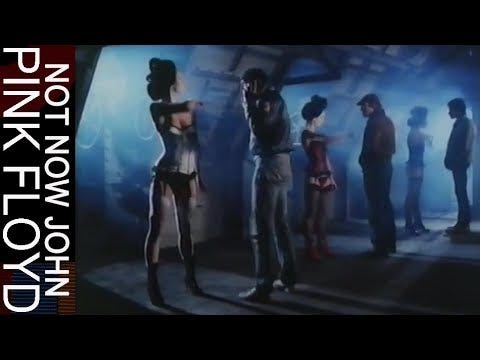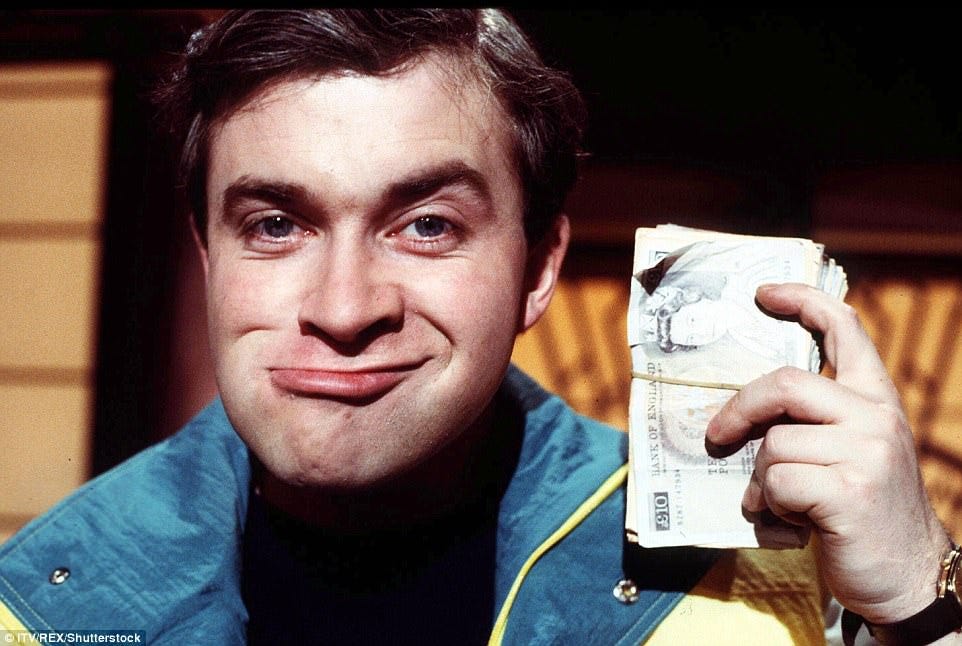My return to the blogging format on this platform has finally allowed me the chance to begin a project which is a little more intimate and closer to my heart, namely, to take a closer look at Pink Floyd's music within the format of a series.
I've been rather fascinated and transfixed by the music of Pink Floyd for most of my life now, despite the fact that, strictly speaking, they're not of my generation but the boomer generation. Indeed, in many respects Pink Floyd are the quintessential boomer band. But nevertheless I've always been struck by a deeply English sentiment and world-feeling which seems to be embedded in their music, especially when Roger Waters dominated, which he usually did.
In this first part of this series we'll be beginning with perhaps the most political song, on the most political album, which is also one of the reasons Waters left Pink Floyd shortly after. The Final Cut was considered simply too much for Dave Gilmour who usually sang and always played lead guitar. The album often feels like leftovers from The Wall, and at the same time an extension, indeed an indulgence, of Waters' nostalgia and yearning for an England lost, his father's death in World War 2 and the stagnation of British life after the war.
Not Now John is the penultimate song on The Final Cut, but in pitch and melody, in aggressiveness and loudness it seems to have been dropped in from another album entirely. It is immediately preceded by the Final Cut itself, which is a deeply melancholic sojourn into depression and isolation and attempted suicide. Not Now John instantly brushes such tenderness aside with the opening barrage from Gilmour (the only time he gets lead vocals on the album):
''Fuck all that we've gotta get on with these''.
Just to reiterate, up until now the entire album has conjured images of:
She stands upon Southampton dock
With her handkerchief
And her summer frock clings
To her wet body in the rain.
In quiet desperation knuckles
White upon the slippery reins
She bravely waves the boys goodbye again.
It's an England of brass bands marching through rainy Yorkshire towns trying in vain to celebrate the victory of one too many wars, that nobody has really recovered from but nobody can explain why. It's an England of civil servants pulling up their jobs as petty tyrants within the bowels of a Brutalist building on the outskirts of an industrial city being de-industrialized. Introspection, loss of meaning, loss of direction.
And into this despondency Not Now John bellows ''Fuck all that!''
Margaret Thatcher and Neo-liberalism have arrived. There's no more time for soul-searching and nostalgia, there's work to be done... lots of work:
Can't stop! Lose job! Mind gone! Silicon! What bomb? Get away! Pay day! Make hay! Break down! Need fix. Big six. Clickity click. Hold on! Oh no, Bring bingo!,Make 'em laugh
Waters and Gilmour reprise their tradition of adopting differing roles within the narrative structure on Not Now John. The ''John'' of the title is the everyday Englishman, the ''John Bull'' archetype. Here his thoughts are expressed by Waters, while Gilmour represents ''The Machine'' or wider society. Waters' "John" is the introspective and sensitive English consciousness of the previous album tracks. Gilmour is loud and vulgar representing the new spirit of the hyper-consumerist age.
Symbolically, Not Now John represents the re-emergence of The Machine from Wish You Were Here. The melody is similar but in Not Now more frantic and less complicated. If Welcome to The Machine was a lament over artistic brilliance being commodified and erased of spirit, then Not Now is the same process happening to the proletariat, the mass-man.
John's attachment to a post-war England with a low-key patriotism is usurped and territorialized by the forces of the market and competition with economic rivals:
Fuck all that we've got to get on with these
Got to compete with the wily Japanese
No need to worry about the Vietnamese
Got to bring the Russian Bear to his knees
Well, maybe not the Russian Bear
Maybe the Swedes
We showed Argentina
Now let's go and show these
Make us feel tough
And wouldn't Maggie be pleased?
This new, astro-turfed patriotism in service to economics is what John is now being bullied and cajoled into accepting as his identity by the domineering bellow of Gilmour. The trope of 1980s materialism was never better lampooned than by Harry Enfield and his ''Loadsa Money'' character, a low intelligence arrogant twerp who defines himself by what he has earned.
Naturally this mindset puts work, employment and ''graft'' front and centre of all cultural life and this leads John to become quietly questioning of his lot within the system:
Hold on John
I think there's something good on
I used to read books but
It could be the news
To which, naturally, he's shouted down with another ''Fuck all that!''. There's no time for books or reading, or art or religion or Being or identity. It's inefficient and we can't have the Nips and the Arabs getting the upper hand.
The brass bands will fall silent as their homes become assets and their communities become competitors in the permanent death-match of upward mobility in the market, the identity of middle England being shattered in the process. No time to think about that now though - there's another 12-hour shift to do and the wife wants a new kitchen - not now John!
As somebody who has wasted decades of his life in low-paid factory and warehouse jobs where hours mean more than skills, the depiction of the English working man transforming into a boorish wage-slave hits home pretty hard. Admittedly there's an issue here; after all Pink Floyd are multi-millionaire rock stars and Not Now John could be construed as having a profound contempt for the working classes. Certainly when we consider the lines that see out the song:
Se para collo pou eine toe bar
s'il vous plait ou est le bar
(Say it in English!)
Oi, where's the fucking bar John?
This is the cliche of the arrogant English beer monster now suitably well-heeled enough that he can fly off and ''get pissed'' in Spain on the package holiday he's spent all year toiling to afford. This is accurate. These carrots are dangled in front of the working man to justify the act of sinking large portions of his life into performing utterly pointless and mundane tasks. I've lost count of all the heated arguments I had with supervisors when I flatly refused to work endless hours of over-time. Yet at the same time I found it difficult to justify why I didn't want to do it. After all, it was time and half and what I was doing amounted to turning down money.
The real issue was, to quote another Floyd song, Time. The present was being sacrificed for some vague reward further down the line as the moments that make up each day become quantified and reduced to monetary value, rather than lived authentically. And while in that mindset, striving for the next flat-screen or holiday or mortgage, what really mattered, our identity, disappeared. The vulgarity and boorishness was what today people would describe as ''cope''.
This is the transition of the English soul of Floyd's Final Cut. We hadn't come to terms with what we were or wanted to be after World War 2, but before we could dwell on it too long we were catapulted into the meat grinder of neoliberal economics. The monetization of everything, especially your time, replaced identity.
My father has told me many times of sitting in the canteen of a factory at 3am cynically explaining to his colleagues that ''There has to be more to life than this!'' and after they roll their eyes his weary interlocutor would reply....
Not Now John.







I have just subbed mate, the work you do is powerful and important. I share your videos all the time. I have to say, that's a fucking brilliant breakdown of that Pink Floyd song. You should do more music reviews .
I lost interest in Floyd after Animals although I went to see The Wall at the Cinema. So, this is interesting to me as I share some things in common with both yourself and RW. Son of a WW2 veteran but a relative underachieving art school grad like Woes and Woodlander. I think your analysis is better than many PhDs would muster and it's probably because you are an autodidact.
I was old enough to see Floyd at Knebworth and it was great but they always had a self importance which irritated me.
I'm more a fan of ' English whimsy' ie early Genesis, Van de Graf etc.